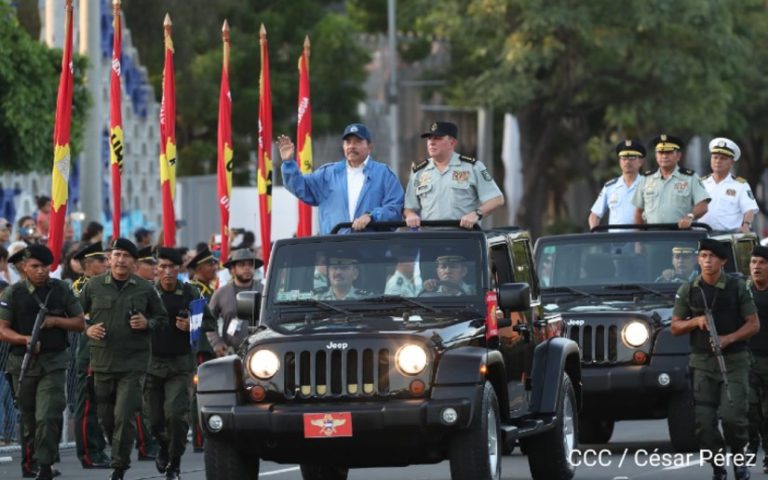20 de febrero 2020

Children of Exile: The Births “Sowing Hope” in the Camp of Nicaraguan Farmers

PUBLICIDAD 1M
PUBLICIDAD 4D
PUBLICIDAD 5D
Julio Cesar Aviles has already been in his position for ten years and goes for five more, but his future is tied to the political destiny of Ortega

What General Julio Cesar Aviles said in his speech marking the 40th anniversary of the army was worthy of note. But what he didn’t say is just as relevant.
General Julio Cesar Aviles will begin his third consecutive term as head of the Nicaraguan Army on Friday, February 21, after having been extended in his post twice by President Daniel Ortega.
This means that Aviles has already commanded the Army for ten years and goes for five more, but his future is tied to the political destiny of the dictator. If Ortega is displaced from power, as will most likely occur in the short term because his dictatorship is unsustainable, General Aviles will also be removed from his post to clear the way to a large-scale military reform.
Until 2010, the last three military chiefs, Generals Joaquín Cuadra, Javier Carrion, and Omar Halleslevens, completed their five years in office, and at the end of their period they abided by the law and retired.
However, since his return to power in 2007, Ortega imposed a relationship of submission with the Police and the Army to his authoritarian political power, with the complicity of Aminta Granera and Julio Cesar Aviles. First, he violated the law of the Police to extend Granera in office, and then in 2014, he amended the Military Code to extend the Aviles period.
The cooptation of the military institutions would never have been possible without the participation of the necessary collaborators who put personal interests ahead of the law, their patriotic duty and their obligation to their institutions.
The permanence in their posts that today corrodes the leadership of the military institutions is a political disease derived from the indefinite reelection of Daniel Ortega in his eagerness to perpetuate a dictatorship.
Its consequences are visible in the institutional collapse of the National Police that began with Granera. Meanwhile, the command of Aviles for ten years, which he now intends to continue after the April 2018 massacre, has done irreparable damage to the public’s confidence in the Nicaraguan Army.
The political alignment of Aviles with Ortega and his refusal to order the disarmament and dismantling of the paramilitary gangs that unleashed the repression and the deadly “Operation clean up” represents an act of political complicity, which has damaged the image of the military institution from top to bottom.
Aviles’ tenure after two periods has already affected the promotion of the true military professionals, hindering the development of the institution. This process began in 2013, when he pushed aside Major General Oscar Balladares, former Chief of Staff, who was number two in the Army and would be his natural successor in 2015.
Under a democratic, post-Ortega government, after a free and transparent election, it will be imperative to undertake a profound reform of the military institution. For this reason, when this third period of Aviles begins on February 21st, in reality what starts is the countdown to his departure, followed by the democratic reform of the Army.
Archivado como:
PUBLICIDAD 3M
Periodista nicaragüense, exiliado en Costa Rica. Fundador y director de Confidencial y Esta Semana. Miembro del Consejo Rector de la Fundación Gabo. Ha sido Knight Fellow en la Universidad de Stanford (1997-1998) y profesor visitante en la Maestría de Periodismo de la Universidad de Berkeley, California (1998-1999). En mayo 2009, obtuvo el Premio a la Libertad de Expresión en Iberoamérica, de Casa América Cataluña (España). En octubre de 2010 recibió el Premio Maria Moors Cabot de la Escuela de Periodismo de la Universidad de Columbia en Nueva York. En 2021 obtuvo el Premio Ortega y Gasset por su trayectoria periodística.
PUBLICIDAD 3D